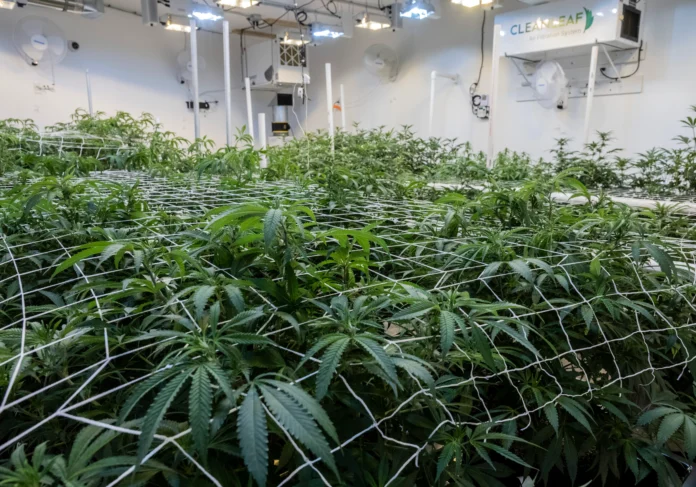
PROVIDENCE – Lawmakers appear to have ironed out their differences over how to regulate recreational marijuana, striking a compromise in amended legislation unveiled by bill sponsors on Tuesday. The latest version of the plan to legalize and tax recreational cannabis preserves the same social equity focus and general regulatory structure, but with a few tweaks aimed at assuaging concerns by the governor’s administration over separation of powers.
“This is a great example of how effective the hearing process can be,” said Sen. Joshua Miller, D-Cranston, explaining how prior committee hearings and written feedback from community advocates and state officials shaped the legislation.
The modified version specifically addresses concerns from Gov. Daniel J. McKee’s administration over the appointment process, which representatives said in written testimony violated state separation of powers principles by giving the R.I. Senate “unfettered discretion” over the three-member Cannabis Control Commission.
The revised version preserves the New York-based model of empowering an appointed commission to finalize the rules and approve licenses to recreational cannabis retailers. However, the governor now has free reign over who to appoint, with the option to consult from a list of recommendations from the R.I. House, said Rep. Scott Slater, D-Providence. The prior version of the bill required the governor to choose his nominees from two lists submitted by the House and Senate. And the Senate no longer has the power to remove commission members, another sore spot for McKee’s office.
The legislation still leaves it up to the commission to decide how to award the 24 new retail licenses – in addition to the nine already licensed medical marijuana centers that will be able to sell to retail customers too. McKee had proposed a lottery system to award the licenses, but Slater and Miller both said Tuesday they favored a merit-based system, highlighting the problems with the state’s use of a lottery to award six medical marijuana licenses.
And McKee appears to be on board.
“While this bill is different from the Governor’s original proposal – it does accomplish his priorities of making sure legalization is equitable, controlled, and safe,” Alana O’Hare, spokeswoman for McKee’s office, said in an emailed statement on Tuesday. “We look forward to reviewing the final bill that comes out of the General Assembly and signing legalization of adult use cannabis into law.”
Recreational pot shops would still be subject to 20% in state and local taxes. Previous studies suggest the state could bring in up to $20 million in state tax revenue by legalizing recreational marijuana, but those numbers are several years old and likely outdated at this point, according to Miller.
Both Miller and Slater expressed optimism that the decade-long push to legalize recreational pot shops will come to fruition this year. But when consumers can start buying from licensed retailers it may also take longer.
The amended legislation pushes back the start of retail cannabis sales from Oct. 1 to Dec. 1. Only the three existing compassion centers and potentially, a few of the newly licensed medical marijuana stores, will be ready for that Dec. 1 deadline, with licenses for new retailers likely to follow the same 16 month timeline as Massachusetts, Miller said.
Home growers, who are allowed to grow up to six plants for personal use at home, could begin as soon as the bill is signed – potentially within a few weeks.
Other changes to the existing legislation include:
- People with past records of civil violations, misdemeanors or felony convictions for possession of the newly legalized amount of cannabis will have their records automatically expunged. The prior bill required them to petition for expungement and pay a fee.
- The cannabis commission will immediately take over regulation of the state’s medical marijuana program. A prior version of the bill imposed a six-month delay until the commission took over the medical marijuana program from the R.I. Department of Business Regulation.
- Two of of the governor’s appointees to the Cannabis Advisory Board that represent the cultivation and retail industries will now be appointed by the Speaker of the House and Senate President, respectively. The makeup of the 11-voting-member group remains the same.
- The state cannabis office is now considered as an “administrative arm” of the commission rather than an internal part of DBR, with a separate administrator to be appointed by the governor.
- Cities and towns that already host a compassion center cannot opt out of hosting retail pot shops. Those with existing cultivators and testing laboratories still can, but the existing facilities will be grandfathered in.
- Cities and towns can also adopt provisions to restrict or ban public marijuana smoking or vaping.
The amended bills are slated to be voted on by the Senate Judiciary and House Finance committees on Wednesday then advance to votes before each full chamber on May 24.
If approved, Rhode Island would become the 19th state to legalize recreational marijuana.
Nancy Lavin is a PBN staff writer. You may reach her at Lavin@PBN.com













Just what we need. Like RIers aren’t dopey enough already.